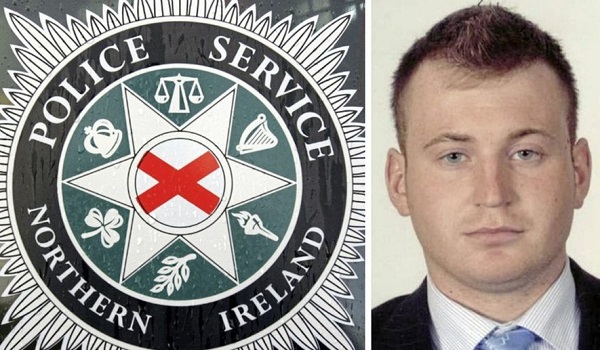Officer sanctioned after affair with member of gang linked to PC Ronan Kerr killing
A female officer who had an inappropriate sexual relationship with an associate of a criminal gang linked to the 2011 murder of a Police Service of Northern Ireland (PSNI) officer has been disciplined – but allowed to return to work.
The officer was suspended from duty some years ago after the affair emerged and an investigation was launched by the PSNI.
It stated that she was brought before an internal misconduct hearing last month where she received sanctions, including having her pay docked.
However, she is now free to return to operational duty.
Police Constable Ronan Kerr, a 25-year-old Catholic, was killed on April 2, 2011 when a booby-trap bomb exploded under his car in Omagh.
The criminal gang is suspected of involvement in the theft of cars for dissident republicans involved in the murder plot.
Responsibility for the attack was later claimed by a dissident republican group claiming to be made up of former members of the Provisional IRA. No one has ever been charged with his murder.
As the misconduct proceedings have now finalised, the officer has returned to an operational role.
For Omagh, the 2011 blast was a reminder of dissident republicans striking the town for a second time – more than 12 years after the 1998 Omagh bomb killed 29 people.
The misconduct proceedings against the female officer were held around seven weeks ago.
A number of misconduct charges – two ‘integrity matters’ and two ‘professional duty matters’ – were upheld at the internal disciplinary.
On professional duty matters, the officer was found to have engaged in an inappropriate relationship with a person involved in and associated with criminality.
The officer was also reprimanded for failing to abide by property management procedures and retaining items of evidence at her home.
On integrity matters, the officer was found to have received information about persons of interest to police potentially breaching bail but failed notify colleagues. Another reprimand sanction was imposed.
The officer also breached police bail conditions placed on her, for which the hearing reportedly imposed a year-long pay reduction equating to more than £9,000.
The police officer had initially been suspended while the PSNI carried out a criminal investigation, but she was later allowed to return to office-based work.
However, following the internal disciplinary, the PSNI has confirmed the officer has now returned to an operational role.
Chief superintendent John McCaughan, head of the PSNI’s Professional Standards Department, said a file had been sent to the Public Prosecution Service for Northern Ireland (PPSNI) in 2014 following a force investigation, but it had “directed no prosecution in relation to all matters reported to them”.
As the matter was not the subject of a public complaint, it was not referred to the Police Ombudsman for Northern Ireland.
Chief Supt McCaughan told Police Professional: “The charges were proven and the officer received a number of disciplinary sanctions as a result.
“As the misconduct proceedings have now finalised, the officer has returned to an operational role.
“The duty status of the officer was kept under review throughout the process.
“Decisions as to whether or not an officer required to be suspended from duty were guided by the Police (Conduct) Regulations 2000 in this particular case.
“This places an obligation upon the service to keep the duty status of an officer under continual review, to ensure that any decision is lawful, necessary and proportionate.
“An officer was initially suspended at the commencement of the investigation, and later returned to a non-public facing, outside the evidential chain until the misconduct proceedings finished.”
A PPSNI spokesperson said: “The PPS received a file from the PSNI in February 2014 concerning a number of allegations against a serving police officer, including misconduct in public office and attempting to do an act with intent to pervert the course of justice.
“After careful consideration of all the available evidence in this case, it was concluded in September 2014 that the test for prosecution was not met on the grounds of insufficient evidence to provide a reasonable prospect of conviction.”


